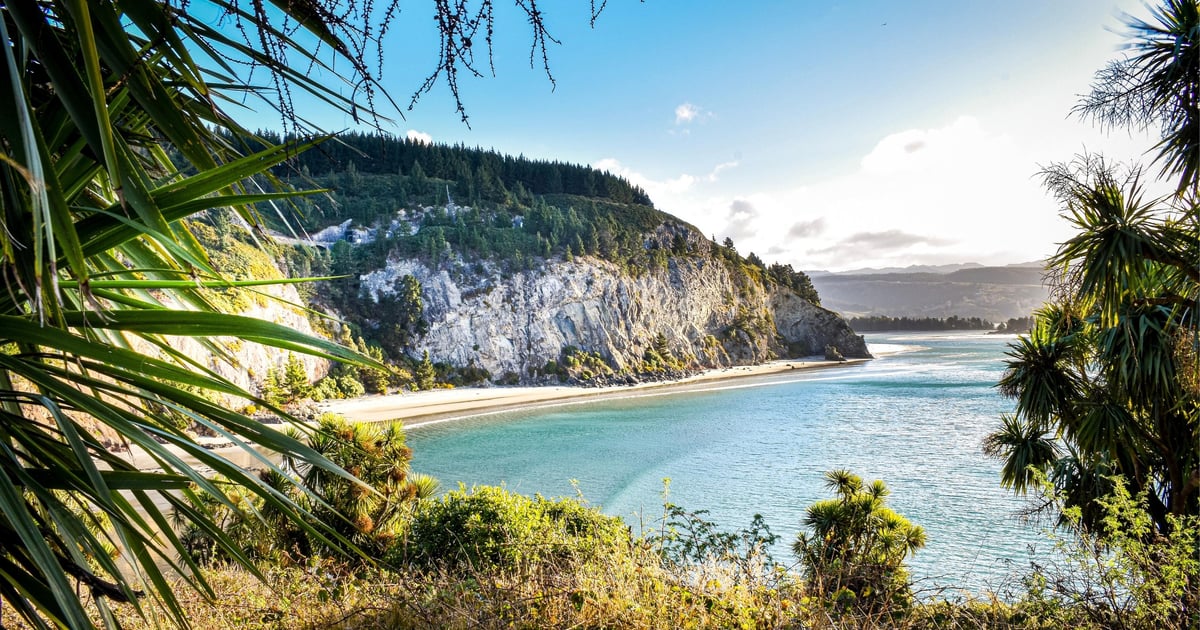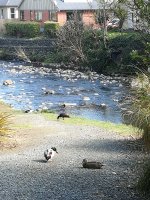I go on a lot of Boy Scout hikes. If I were in an adventuring party in a fantasy world, I'd never make it.
Our hikes average anywhere from a half hour to several hours, depending on the terrain and season. We have one Scoutmaster who could easily qualify as a ranger, but for the rest of us, real life challenges make it clear that out-of-shape wizards are going to be in trouble if they have to walk to their next destination.
Adventurers in this sort of terrain will likely have challenges tracking, finding a path, and even just moving through it. This is one of the reasons I started using a walking stick, if only to test how to proceed. Characters familiar with the outdoors (barbarians, druids, ranger) will have an easier time of it than those who are unaccustomed to being outside the confines of their hometown.
In unfamiliar terrain, a hike is not merely something you do while you do something else. Characters who want to perform most skills in difficult terrain will find it nearly impossible. Except maybe for singing, so the bards have something to do (the Scouts won't let me though for good reason).
Characters who are uncoordinated or unaccustomed to traveling outdoors may well take damage just by trying to make their way, or end up exhausted in the process.
Cityfolk unaccustomed to the outdoors may be surprised how visible their blundering is to beasts and trackers. When cover your tracks, getting the wizard to stop leaving crumbs behind is as important as leaving fewer footprints.
Find the path eliminates a lot of the guesswork of trying to find the easiest route through rough terrain (a bit like spotting trail markers even when there are none). And freedom of movement is like walking on a flat road. But the most magically economical solution is probably the fly spell. Flying over a forest is a significant advantage, and species with natural flight can get places much faster than their grounded companions.
Your Turn: How has your real life hiking experience influenced traveled in your games?
Our hikes average anywhere from a half hour to several hours, depending on the terrain and season. We have one Scoutmaster who could easily qualify as a ranger, but for the rest of us, real life challenges make it clear that out-of-shape wizards are going to be in trouble if they have to walk to their next destination.
Weather Matters
For obvious reasons, walking in the snow can be tough. We avoid hiking in winter, but we have hiked in Spring and Fall through rocky terrain. The toughest terrain we've encountered if after a recent rain with leaves on the ground. The combination makes it difficult to see a clear path (if there even is one). We've gotten lost in places we've hiked previously just because leaves covered everything. Wet leaves also make the ground slippery. More than one Scout has plunged their foot into an unseen puddle or slipped on a rock.Adventurers in this sort of terrain will likely have challenges tracking, finding a path, and even just moving through it. This is one of the reasons I started using a walking stick, if only to test how to proceed. Characters familiar with the outdoors (barbarians, druids, ranger) will have an easier time of it than those who are unaccustomed to being outside the confines of their hometown.
Hikes Are Exhausting
When the weather's nice, I try to walk every day in my neighborhood and when it's not I run on my treadmill. In both cases, the terrain is flat enough that I can turn off my brain. Not so when hiking, which requires constant vigilance as you determine your next step, avoid blundering into branches, and try to spot the path forward.In unfamiliar terrain, a hike is not merely something you do while you do something else. Characters who want to perform most skills in difficult terrain will find it nearly impossible. Except maybe for singing, so the bards have something to do (the Scouts won't let me though for good reason).
Natural Hazards
The outdoors can be beautiful but it isn't ordered to make life easier for anyone to pass through it. Woods are filled with dead branches and fallen trees that will have to be circumnavigated. The aforementioned leaves make everything slippery and conceal holes that can trip you up. And there is wildlife that can react poorly to intrusions -- my son was stung by a hornet just walking up rocky steps near a castle.Characters who are uncoordinated or unaccustomed to traveling outdoors may well take damage just by trying to make their way, or end up exhausted in the process.
Leave No Trace
In Scouts, we encourage the philosophy of "leave not trace," which means you leave the terrain how it was when you arrived. That means no picking up sticks or feathers or rocks to take with you. It also means essentially covering your tracks.Cityfolk unaccustomed to the outdoors may be surprised how visible their blundering is to beasts and trackers. When cover your tracks, getting the wizard to stop leaving crumbs behind is as important as leaving fewer footprints.
Avoiding the Long Hike
The modern solution to these challenges is to just take a car or walk on a paved road. In fantasy campaigns, there are rarely equivalents, but magic provides some solutions.Find the path eliminates a lot of the guesswork of trying to find the easiest route through rough terrain (a bit like spotting trail markers even when there are none). And freedom of movement is like walking on a flat road. But the most magically economical solution is probably the fly spell. Flying over a forest is a significant advantage, and species with natural flight can get places much faster than their grounded companions.
Your Turn: How has your real life hiking experience influenced traveled in your games?





